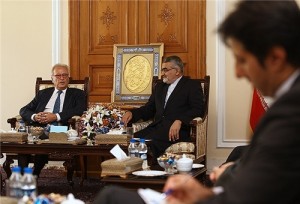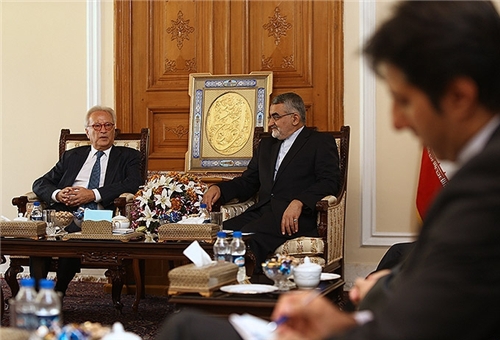 TEHRAN (FNA)- Chairman of the Iranian Parliament's National Security and Foreign Policy Commission Alaeddin Boroujerdi�underlined that Iran as a signatory to the Non-Proliferation Treaty (NPT) is after utilizing nuclear technology for peaceful purposes.
TEHRAN (FNA)- Chairman of the Iranian Parliament's National Security and Foreign Policy Commission Alaeddin Boroujerdi�underlined that Iran as a signatory to the Non-Proliferation Treaty (NPT) is after utilizing nuclear technology for peaceful purposes.Speaking at a meeting with the European Parliament (EP)'s Delegation, headed by Hannes Swoboda, the senior Iranian parliamentarian Sunday once more stressed the peaceful nature of Iran�s nuclear energy program.
Boroujerdi further underscored Tehran�s legitimate right to peaceful use of nuclear energy.
The EP delegation, comprised of three Socialist European lawmakers, arrived in Tehran on Saturday for a four-day visit.
Iran says its nuclear program is a peaceful drive to produce electricity so that the world's fourth-largest crude exporter can sell more of its oil and gas abroad. Tehran also stresses that the country is pursuing a civilian path to provide power to the growing number of Iranian population, whose fossil fuel would eventually run dry.
The US and its western allies allege that Iran is pursuing a nuclear weapons program while they have never presented corroborative evidence to substantiate their allegations against the Islamic Republic.
Iran is under four rounds of UN Security Council sanctions for turning down West's calls to give up its right of uranium enrichment, saying the demand is politically tainted and illogical.
Iran has so far ruled out halting or limiting its nuclear work in exchange for trade and other incentives, saying that renouncing its rights under the NPT would encourage the world powers to put further pressure on the country and would not lead to a change in the West's hardline stance on Tehran.
Iran has also insisted that it would continue enriching uranium because it needs to provide fuel to a 300-megawatt light-water reactor it is building in the Southwestern town of Darkhoveyn as well as its first nuclear power plant in the Southern port city of Bushehr.
Tehran has repeatedly said that it considers its nuclear case closed as it has come clean of the International Atomic Energy Agency (IAEA)'s questions and suspicions about its past nuclear activities.
By Fars News Agency
The Iran Project is not responsible for the content of quoted articles.











